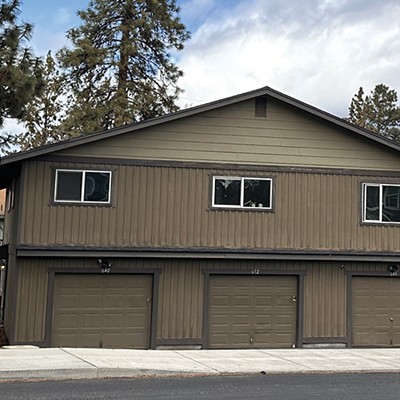It's not often that we see Rep. Gene Whisnant (R-Sunriver) poke up his head in Salem other than to stump for the most provincial and honorary pieces of legislation. This is not a legislator who's ever been accused of having too much vision. But like a rock chuck sensing spring, Whisnant popped up a few weeks ago in the whirlwind February session to block a pair of bills that would have helped Oregon homeowners who are facing the prospect of foreclosure.
While we're usually looking for Whisnant to do more with his time in Salem, in this case we wish that he would have just kept on hibernating. After refusing to allow the bills to come up for a hearing in the House General Government and Consumer Protection Committee, Whisnant offered an amendment that proved to be a deal breaker for the bills' backers and on Tuesday Democrats announced that the home foreclosure bills were essentially dead in the waning hours of the session.
It's not unusual for there to be some give and take in Salem, but the real losers in this pissing match are Oregon homeowners who continue to lose their homes at an alarming rate in the ongoing foreclosure crisis. While proponents have no illusions that the bills, which passed the Oregon Senate with bi-partisan support (one of them was sponsored by Sen. Chris Telfer), would end the foreclosure fiasco, they represented an important step for consumers who would have been given increasing standing in the foreclosure process. Just as importantly, the legislation would have stopped banks from putting homeowners on a dual-track process when they go into default. Under SB 1552, banks would have been required to participate in mandatory mediation process with homeowners who miss payments. A similar process is already in place in 21 other states and is designed to force banks to the negotiating table, a place that many banks have been unwilling to meet with borrowers. Instead, banks prefer to strong arm borrowers into making the maximum payment until the homeowner is bled dry and defaults, whereupon the bank collects its mortgage insurance and moves on while the borrower is left with no home and a credit report in shambles.
Given the state of the economy, that doesn't strike us as a great set up for consumers. Whisnant, however, favored an approach that would have taken the teeth out of the bill by making the mediation process voluntary and removed several of the enforcement provisions.
Not surprisingly, that didn't sit well with Dems who refused to agree to changes that would have deprived the bill of any real teeth.
Whisnant also favored a different approach to the dual-track issue. Under Whisnant's amendment banks would be required to inform lenders if they might qualify for a lower interest rate or other program, those borrowers who do not would be given a foreclosure date. Sounds like a great deal, Gene.
Rather than hammer out a sensible compromise, House leaders, including Whisnant, appear willing to wait another year to address the foreclosure crisis. In the meantime, more Oregonians will lose their homes - not because they don't want to pay their bills, but because banks, who, themselves, were given trillions of dollars in assistance during their time of need, are now unwilling to work with their customers.
For their failure to see commonsense legislation when it stares them in the face, we're giving House Republicans and our own Gene Whisnant the Boot and suggest voters do the same the next their names appear on the ballot.


























